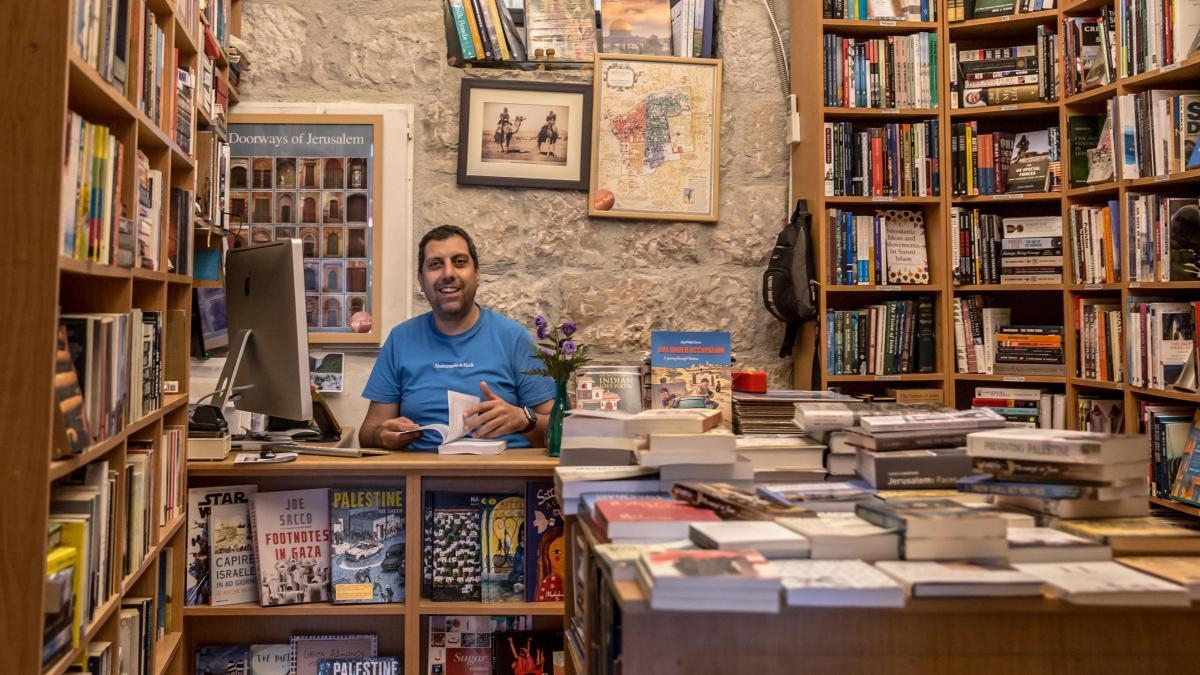Mahmoud Muna, a bookseller in Jerusalem: “I was imprisoned for selling books about Palestine.”

The fact that Mahmoud Muna's bookstore, the Educational Bookshop in East Jerusalem, is a center of cultural and political debate has raised eyebrows since the beginning of the conflict with Palestine. So much so that, last February, police arrested him and his nephew Ahmed, both accused of selling books that "incite hatred" against Israel. These days, he is one of the most sought-after guests at the Frankfurt Book Fair, which began Wednesday and runs until tomorrow. His speech is yet another example of the lack of freedom of expression in conflict-torn territories.
Indignation Israel has crossed a red line. We do not accept the narrative that a bookstore is a place that incites hatred.On February 9, the world turned its attention to his business, the most important Arabic bookstore in Jerusalem.
I wish they'd done it for another reason, but I imagine police reports are more compelling. No wonder; what happened was surreal.
Can you give details?
We have several businesses, but it all happened at the location on Saladino Street shortly after lunch. Some officers showed up at the establishment and took out their phones. They opened Google Translate and started browsing books haphazardly, I imagine looking for excerpts about Palestine. I don't know, I didn't ask them. They already came with the intention of accusing me, so it was hard to change their minds.
Accuse him of what?
For inciting hatred. I was imprisoned for that, but the uproar was so great, both from neighbors and the international press, that they quickly realized it was better to release me.
But it took them a while to do so.
Yes, because then they changed their charge and said I was responsible for disturbing public order. I ended up being released on bail, and luckily, they didn't press charges against me, I imagine because my bookstore is an important cultural institution in Jerusalem, often visited by travelers, diplomats, and journalists.

Mahmoud Muna and his nephew after being arrested last February
Mahmoud Illean / AP-LaPresseDo you think another business would not have had the same luck?
It's hard to say, but I don't think so. In any case, it's a red line that shouldn't have been crossed. We shouldn't accept this dictatorship and this narrative that bookstores are places that incite violence. We're dedicated to provoking ideas and allowing them to collide; that's our job. But there are many people who don't understand that.
Were you able to return to your job safely?
The curious thing about all this is that the bookstore never closed its doors. The charges were against me and my nephew, not the business. So during my time in prison, I was fortunate that family, friends, and neighbors took the lead. I wanted to return later, but the authorities prohibited me from returning for twenty days. After that, I tried to get everything back to normal.
Read also Israeli police close Jerusalem's largest Arabic bookstore Xavier Mas de Xaxàs
After going through something like that, it shouldn't be easy.
My first day was strange, but by the second, I understood that booksellers should never be subjected to persecution. That made me stronger, and I'm grateful for the opportunity to come to the fair to tell my story. I think the Palestinian story is now much more understood and seen as a legitimate cause, worthy of support and solidarity. But I, like everyone else, now need answers and for those responsible for so much pain and destruction to be brought to justice. We must pressure politicians, both current and future, to defend dignity and justice. The cultural and literary scene can help a lot.
You yourself are contributing your part with your book Daybreak in Gaza , which you co-authored with journalist Matthew Teller.
During the first year of the conflict, we felt that the lives of the victims weren't being talked about enough, so we felt the urgency and moral duty to do so ourselves. We were surprised by people's willingness to tell us about their daily lives. They felt that, finally, someone was listening to them.
lavanguardia





